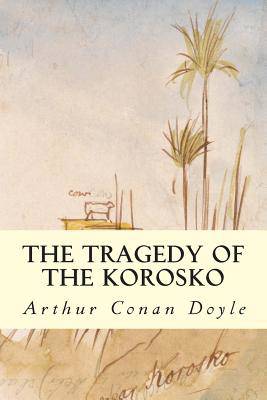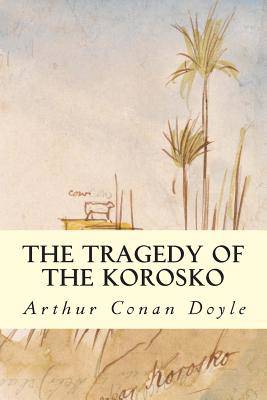
- Afhalen na 1 uur in een winkel met voorraad
- Gratis thuislevering in België vanaf € 30
- Ruim aanbod met 7 miljoen producten
- Afhalen na 1 uur in een winkel met voorraad
- Gratis thuislevering in België vanaf € 30
- Ruim aanbod met 7 miljoen producten
Zoeken
Omschrijving
The Tragedy of the Korosko (1898) is a novel by Sir Arthur Conan Doyle. It was serialized a year earlier in The Strand magazine between May and December 1897. It was later adapted into a play Fires of Fate by Doyle. The play was in turn twice adapted into film, a 1923 silent film and a 1932 talkie.Thirteen tourists, representing mixed nationalities and several religious creeds, find themselves engaged in examining ruins on the Nile when they are captured by dervishes. Blood is shed while they are hurried across the deserts; then the Arabs are captured by the camel corps, and there are many adventures before the surviving Europeans are rescued.Sir Arthur Ignatius Conan Doyle KStJ DL (22 May 1859 - 7 July 1930) was a British writer best known for his detective fiction featuring the character Sherlock Holmes. Originally a physician, in 1887 he published A Study in Scarlet, the first of four novels and more than fifty short stories about Holmes and Dr. Watson. The Sherlock Holmes stories are generally considered milestones in the field of crime fiction.Doyle was a prolific writer; his non-Sherlockian works include fantasy and science fiction stories about Professor Challenger and humorous stories about the Napoleonic soldier Brigadier Gerard, as well as plays, romances, poetry, non-fiction and historical novels. One of Doyle's early short stories, "J. Habakuk Jephson's Statement", helped to popularise the mystery of the Mary Celeste.Doyle is often referred to as Sir Arthur Conan Doyle or simply Conan Doyle (implying that "Conan" is part of a compound surname as opposed to his given middle name). His baptism entry in the register of St Mary's Cathedral, Edinburgh, gives "Arthur Ignatius Conan" as his given names and "Doyle" as his surname. It also names Michael Conan as his godfather.[1] The cataloguers of the British Libraryand the Library of Congress treat "Doyle" alone as his surname.[2]Steven Doyle, editor of The Baker Street Journal, wrote, "Conan was Arthur's middle name. Shortly after he graduated from high school he began using Conan as a sort of surname. But technically his last name is simply 'Doyle'."[3] When knighted, he was gazetted as Doyle, not under the compound Conan DoyleDoyle was born on 22 May 1859 at 11 Picardy Place, Edinburgh, Scotland.[5][6] His father, Charles Altamont Doyle, was born in England, of Irish Catholic descent, and his mother, Mary (née Foley), was Irish Catholic. His parents married in 1855.[7] In 1864 the family dispersed because of Charles's growing alcoholism, and the children were temporarily housed across Edinburgh. In 1867, the family came together again and lived in squalid tenement flats at 3 Sciennes Place.[8] Doyle's father died in 1893, in the Crichton Royal, Dumfries, after many years of psychiatric illness.[9][10]Supported by wealthy uncles, Doyle was sent to England, at the Jesuit preparatory school Hodder Place, Stonyhurst in Lancashire at the age of nine (1868-70). He then went on to Stonyhurst College until 1875. While Doyle was not unhappy at Stonyhurst, he did not have any fond memories since the school was run on medieval principles, with subjects covering rudiments, rhetoric, Euclidean geometry, algebra and the classics.[11] Doyle commented later in his life that the academic system could only be excused "on the plea that any exercise, however stupid in itself, forms a sort of mental dumbbell by which one can improve one's mind. He also found it harsh, citing that instead of compassion and warmth, it favoured the threat of corporal punishment and ritual humiliation.[12]From 1875 to 1876, he was educated at the Jesuit school Stella Matutina in Feldkirch, Austria.[8] His family decided that he would spend a year there with the objective of perfecting his German and broadening his academic horizons.[13] He later rejected the Catholic faith and became an agnostic.
Specificaties
Betrokkenen
- Auteur(s):
- Uitgeverij:
Inhoud
- Aantal bladzijden:
- 140
- Taal:
- Engels
Eigenschappen
- Productcode (EAN):
- 9781500946494
- Verschijningsdatum:
- 25/08/2014
- Uitvoering:
- Paperback
- Formaat:
- Trade paperback (VS)
- Afmetingen:
- 152 mm x 229 mm
- Gewicht:
- 195 g

Alleen bij Standaard Boekhandel
+ 24 punten op je klantenkaart van Standaard Boekhandel
Beoordelingen
We publiceren alleen reviews die voldoen aan de voorwaarden voor reviews. Bekijk onze voorwaarden voor reviews.











